D-PHYS News
All stories that have been tagged with Institute for Quantum Electronics (IQE)
Combing through air with light
- Research
- Physics
- Institute for Quantum Electronics (IQE)
- D-PHYS
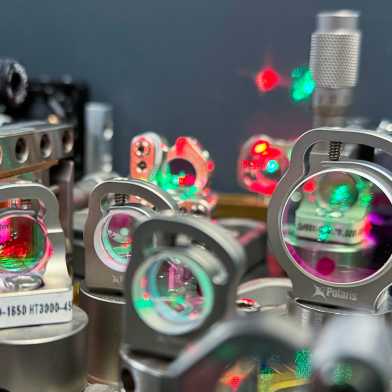
Researchers in the Institute for Quantum Electronics have developed a special dual-comb spectrometer, which relies on a new detection method, to analyse gaseous samples with high sensitivity.
A week with Nobel laureates
- Institute for Quantum Electronics (IQE)
- Physics
- D-PHYS
- People
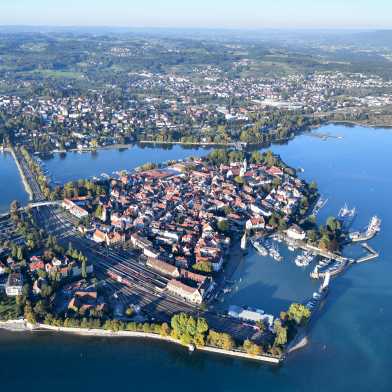
The Lindau Nobel Laureate Meetings in Physics stand as an enriching experience for established and early-career scientists alike.
The marvels of light
- Teaching & Learning
- Physics
- Institute for Quantum Electronics (IQE)
- D-ARCH
- D-PHYS
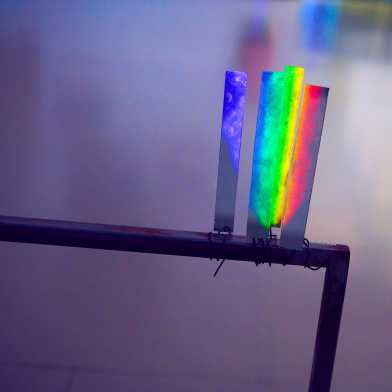
A course offered to D-ARCH and D-PHYS students fosters a space and time for interdisciplinary discourse around electromagnetic radiation.
Nonlinearity makes photonic neural networks smarter
- Physics
- Institute for Quantum Electronics (IQE)
- D-PHYS
- Quantum sciences
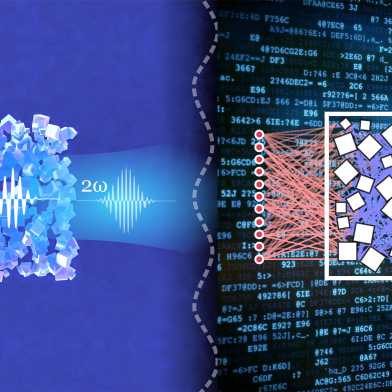
Researchers in the Institute for Quantum Electronics have produced the core processing unit of a photonic neural network in which optical nonlinearity plays a key role in making the network more powerful.
Superfluid surprise
- Research
- Physics
- Institute for Quantum Electronics (IQE)
- D-PHYS
- Quantum sciences
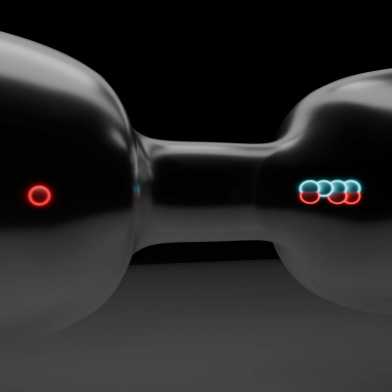
Researchers from the Institute for Quantum Electronics and the Quantum Center studied particle and entropy flows between two connected superfluid reservoirs and found unexpected evidence of irreversible and enhanced entropy transport.
A recipe for scalable quantum dots
- Research
- Physics
- Institute for Quantum Electronics (IQE)
- D-PHYS
- Quantum sciences
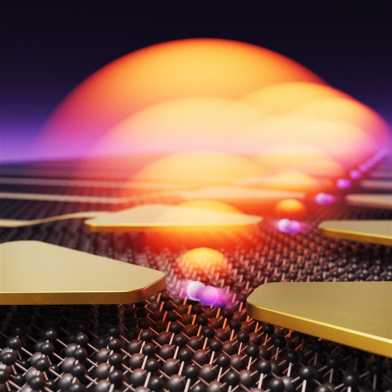
A team including researchers from the Department of Physics at ETH Zurich found a method for creating electrically defined quantum dots with the potential for long-sought tunability and scalability.
Driven by curiosity
- Institute for Quantum Electronics (IQE)
- Physics
- D-PHYS
- People
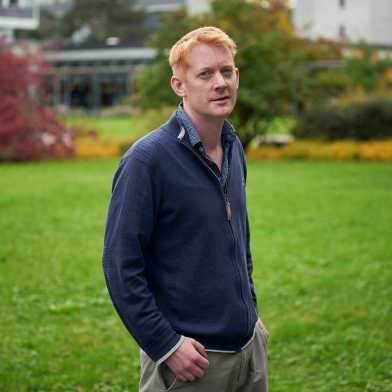
We spoke with Jonathan Home, our current Head of the Department, on becoming a Fellow of the American Physical Society (APS) and about his career, motivations and goals.
The walk that leads to the comb
- Research
- Physics
- Institute for Quantum Electronics (IQE)
- D-PHYS
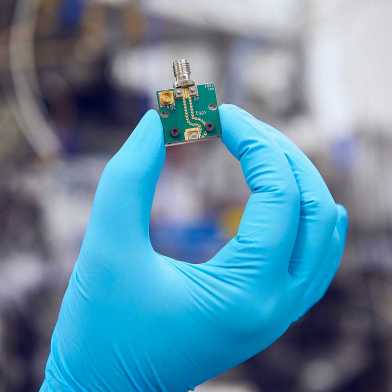
Using a random walk generated by modulating a ring quantum cascade laser, researchers from the Institute for Quantum Electronics at ETH Zurich have realised a new type of frequency comb.
SNSF-funded projects start for Elsa Abreu and Puneet Anantha Murthy
- Research
- Research awards
- Physics
- Institute for Quantum Electronics (IQE)
- D-PHYS
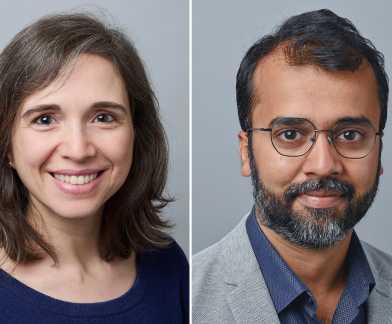
The two researchers, who are members of the Institute for Quantum Electronics, were both awarded SNSF Starting Grants.
Optical solitons go terahertz
- Research
- Institute for Quantum Electronics (IQE)
- Physics
- D-PHYS
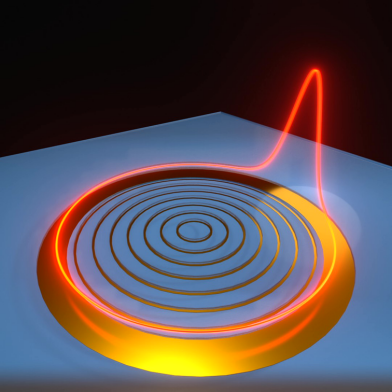
In a feat of optical waveguide engineering, researchers from the Institute for Quantum Electronics at ETH Zurich have successfully observed terahertz solitons in a ring quantum cascade laser.
Single atoms for everyone
- Events
- Institute for Quantum Electronics (IQE)
- Physics
- D-PHYS
- Quantum sciences
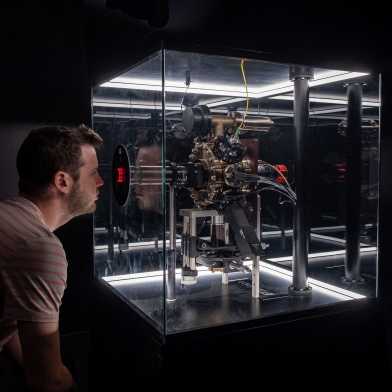
Thanks to a collaboration between the Department of Physics at ETH Zurich and Technorama, visitors to the Science Centre can see with their naked eye very small objects that behave according to the unfamiliar laws of quantum mechanics – single atoms.
Electrons: collective or independent – that sometimes lies in the eye of the beholder
- Research
- Ultrafast science
- Physics
- Institute for Quantum Electronics (IQE)
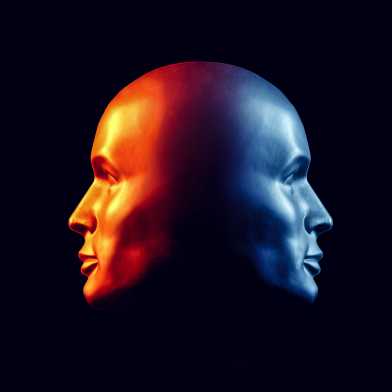
Absorption of light adds energy to a material. The electrons inside the material can react collectively or independently to that energy. Here, the dominant reaction pattern should not depend on perspective. However, in compound semiconductors, surprisingly, divergent responses are obtained depending on which atomic constituent is consulted. Knowledge of both perspectives is necessary to optimize new materials for applications in electronics and optoelectronics.
Integrated photonic circuits could help close the ‘terahertz gap’
- Institute for Quantum Electronics (IQE)
- Physics
- D-PHYS
- Quantum sciences
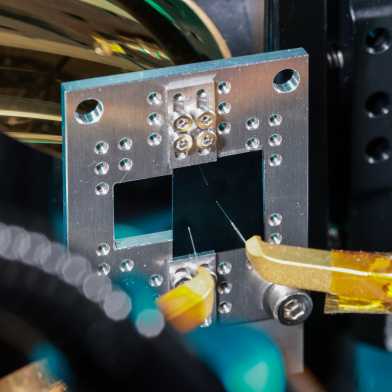
EPFL researchers have collaborated with colleagues at ETH Zurich and Harvard University on a new thin-film circuit which, when connected to a laser beam, produces finely tailorable terahertz-frequency waves. The device opens up a world of potential applications in optics and telecommunications.
Free ride for electrons improves soft X-rays generation
- Research
- Physics
- Institute for Quantum Electronics (IQE)
- D-PHYS
![Foto des Experiments [1], bei dem Kryptonatome (Mitte) mit einem Hochleistungslaser (links) und weicher Röntgenstrahlung beleuchtet werden.](/news-and-events/d-phys-news/2022/12/free-ride-for-electrons/_jcr_content/pageimages/imageSmall.imageformat.contentteaser.1252221582.jpg)
Traffic obstructions are not only a nuisance for our everyday mobility; they can also have negative consequences for the smallest particles such as electrons. If physicists want to study very fast dynamics in matter using soft X-rays, a clear path for electrons is required.
SERI-financed ERC grant for Tobias Donner
- Laboratory for Solid State Physics (LFKP)
- Institute for Theoretical Physics (ITP)
- Institute for Quantum Electronics (IQE)
- D-PHYS
- Astrophysics (IPA)
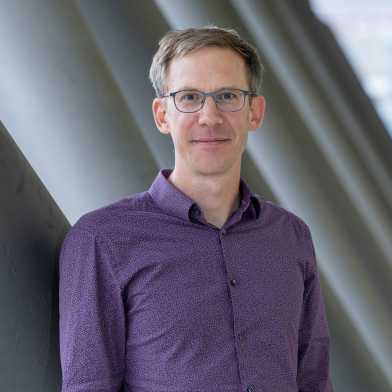
Tobias Donner, Senior Scientist and lecturer in the Quantum Optics Group at the Institute for Quantum Electronics, has received a SERI-financed ERC Consolidator Grant. He plans to use the funding to explore the fundamental principles behind the interaction between quantum many-body systems and light.
A dual boost for optical delay scanning
Institute for Quantum Electronics (IQE)
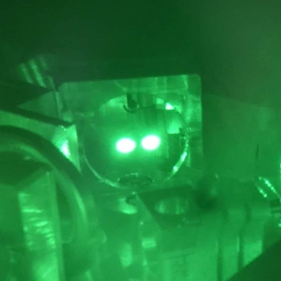
Various applications of pulsed laser sources rely on the ability to produce a series of pulse pairs with a stepwise increasing delay between them. Implementing such optical delay scanning with high precision is demanding, in particular for long delays. Addressing this challenge, ETH physicists have developed a versatile ‘dual-comb’ laser that combines a wide scanning range with high power, low noise, stable operation, and ease of use — thereby offering bright prospects for practical uses.
A quantum pump without the crank
- Institute for Quantum Electronics (IQE)
- Quantum sciences
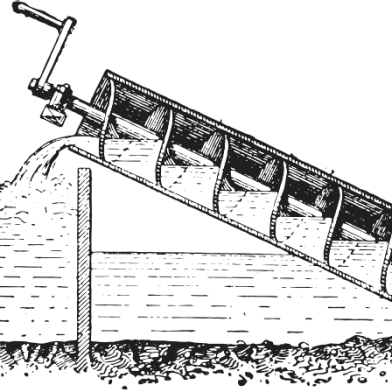
ETH physicists demonstrate how atoms can be pumped through a synthetic crystal without having to apply external periodic driving. These experiments combine several key aspects of quantum many-body physics in unexpected ways, thus paving a novel path to understanding and creating exotic states of quantum matter.
Switzerland wins the World Physics Championship
- D-PHYS
- Astrophysics (IPA)
- Institute for Theoretical Physics (ITP)
- Institute for Quantum Electronics (IQE)
- Physics
- Particle Physics (IPA)
- Physik BSc
- D-PHYS
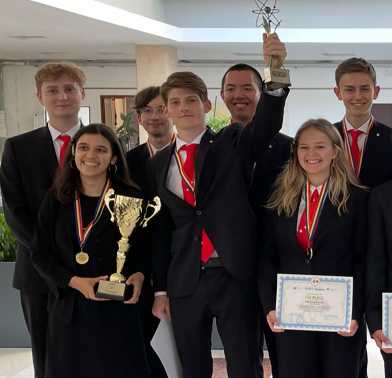
In 2022, the Swiss team won the World Physics Championship, the International Young Physicists' Tournament (IYPT). Singapore and Poland came second and third.
Night of Physics 2022
- D-PHYS
- Astrophysics (IPA)
- Laboratory for Solid State Physics (LFKP)
- Institute for Theoretical Physics (ITP)
- James Webb Space Telescope
- Particle physics
- Institute for Quantum Electronics (IQE)
- Particle Physics (IPA)
- Simulational Physics
- Astronomy
- D-PHYS
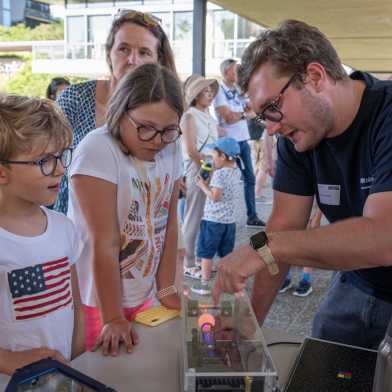
Letting your curiosity run free, asking a thousand questions and learning something new. On 17 June 2022, the Department of Physics at ETH Zurich welcomed several thousand guests at the summer festival of science on the Hönggerberg campus, the Night of Physics 2022.
The side effects of quantum error correction and how to cope with them
- Institute for Quantum Electronics (IQE)
- Quantum sciences

It is well established that quantum error correction can improve the performance of quantum sensors. But new theory work cautions that, unexpectedly, the approach can also give rise to inaccurate and misleading results — and shows how to rectify these shortcomings.
Get connected!
- Laboratory for Solid State Physics (LFKP)
- D-PHYS
- Institute for Quantum Electronics (IQE)
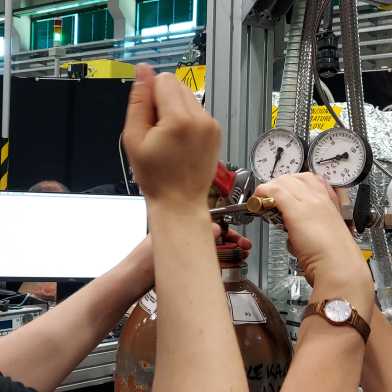
Women scientists in photon science talk about their research and the impact their work has on the field. From the perspective of early career to established researchers, they also talk about necessary skills, career steps, and role models. They are members of the Swiss Society for Photon Science, an academic society that represents and supports scientists active in the many different fields of photon science.
Vacuum fluctuations break topological protection
- Institute for Quantum Electronics (IQE)
- Quantum sciences
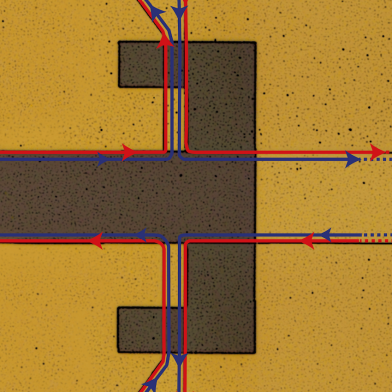
A hallmark of so-called topological quantum states is that they are protected against local perturbations. ETH physicists now demonstrate that in the paradigmatic case of the integer quantum Hall effect, vacuum fluctuations can cause a breakdown of topological protection.
Quantum errors made more tolerable
- Institute for Quantum Electronics (IQE)
- Quantum sciences
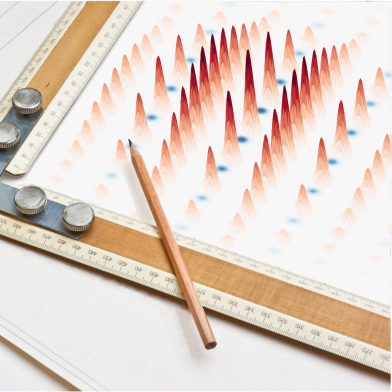
ETH physicists have modified one of the major schemes for quantum error correction and put it into practice, demonstrating that they can substantially prolong the lifetime of quantum states — a crucial ingredient for future large-scale quantum computers.
Quantum Physics at Technorama
- Research
- Institute for Quantum Electronics (IQE)
- D-PHYS
- D-PHYS
- Quantum sciences
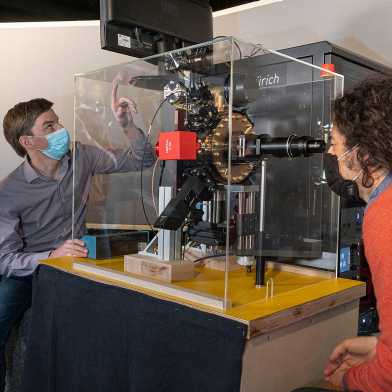
Quantum computers and quantum mechanics are currently the focus of intensive research, including at ETH Zurich, and are also increasingly becoming topics in the media. In this domain, researchers work with the tiniest of particles daily, with a particular emphasis on experimentally realizing a new era of information technologies with capabilities beyond those available to us today. But how can this world of quantum physics be experienced outside the laboratory?
Cascading femtosecond lasers into the mid-infrared
Institute for Quantum Electronics (IQE)
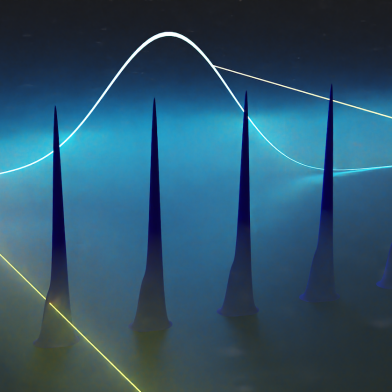
The first demonstration of direct femtosecond-pulse emission from a quantum cascade laser in the mid-infrared region paves the path towards novel applications of ultrashort laser pulses.
Electrical control over designer quantum materials
Institute for Quantum Electronics (IQE)
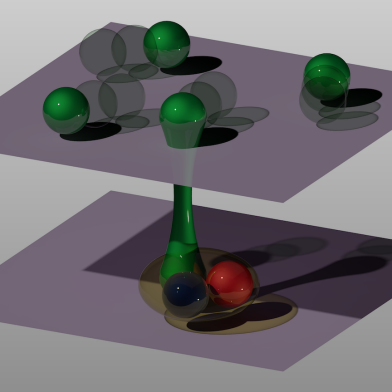
In the past few years, suitably engineered stacks of two-dimensional materials have emerged as a powerful platform for studying quantum correlations between electronic states. ETH physicists now demonstrate how key properties of such systems can be conveniently tuned by changing an applied electrical field.
Switzerland in 50 portraits
- Diversity
- Institute for Quantum Electronics (IQE)
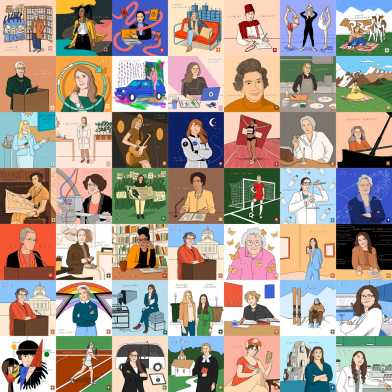
How is Switzerland's performance perceived abroad? What role do women play in this? Women’s contributions and their stories often go untold, their voices unheard, their impact is overlooked. The Federal Department of Foreign Affairs is drawing attention to this on the occasion of the 50th anniversary of national women's suffrage in Switzerland.
Quantum engineers in high demand
- Physik MSc
- D-PHYS
- Institute for Quantum Electronics (IQE)
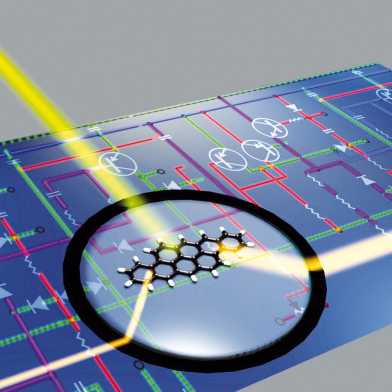
Prof. Lukas Novotny, Dr. Martin Frimmer, and Dr. Gabriele Rainò discuss the approach they are pursuing at ETH Zürich to provide students with an education in quantum engineering at Master's level.
Exploring the limits of light–matter coupling at the nanoscale
Institute for Quantum Electronics (IQE)
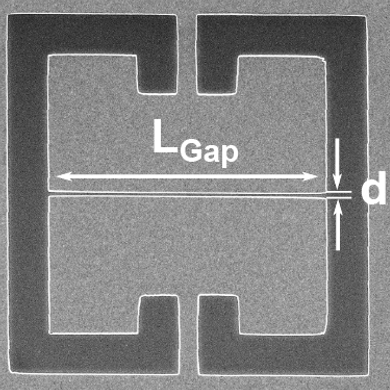
In nanophotonic devices, light and matter can be coupled in ways that give rise to new quantum phenomena. Theoretical and experimental work now establishes that are physical limits to just how strong light–matter coupling can be made in such systems.
Ursula Keller elected member of the National Academy of Sciences
- D-PHYS
- Institute for Quantum Electronics (IQE)
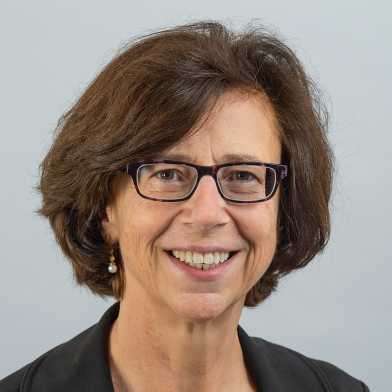
The National Academy of Sciences (USA) has announced the election of 30 international members in recognition of their distinguished and continuing achievements in research, among them ETH physicist Ursula Keller.
Current trend reversed
Institute for Quantum Electronics (IQE)
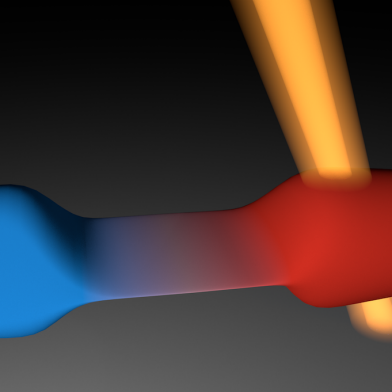
The demonstration that a tiny cloud of atoms can be turned from a heat engine into a cooler by cranking up the interactions between the particles provides both deep fundamental insight and a possible template for more efficient thermoelectric devices.
Lights on for silicon photonics
Institute for Quantum Electronics (IQE)
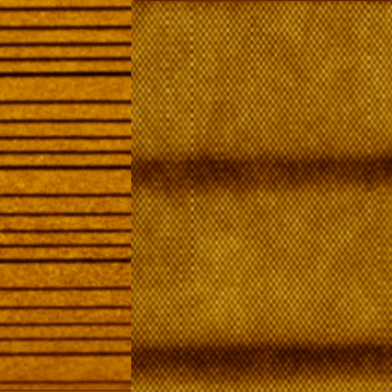
The demonstration of electroluminescence at terahertz frequencies from a silicon-germanium device marks a key step towards the long-sought goal of a silicon-based laser.
Ursula Keller awarded ERC Proof-of-Concept Grant
- Institute for Quantum Electronics (IQE)
- D-PHYS
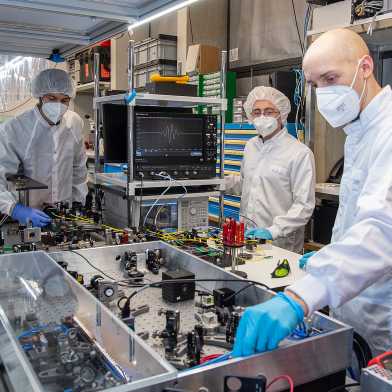
Ursula Keller, professor at the Institute for Quantum Electronics, has received one of the 55 Proof of Concept (PoC) grants awarded by the European Research Council (ERC) in its latest funding round. Kicking off on 1 March 2021, the grant will enable her and her group to explore novel commercial applications of the dual comb-laser spectroscopy.
New professors appointed
- Astrophysics (IPA)
- Institute for Quantum Electronics (IQE)
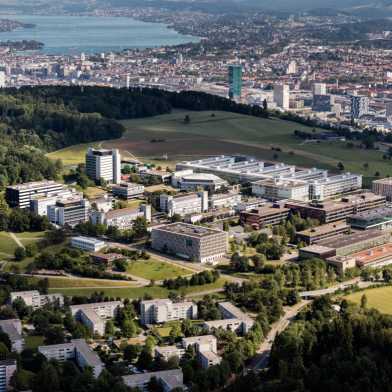
At its meeting of 9 and 10 December 2020 and upon application of Joël Mesot, President of ETH Zurich, the ETH Board appointed 14 professors, among them Rachel Grange as Associate Professor of Photonics and Judit Szulágyi as Assistant Professor of Computational Astrophysics at the Departement of Physics.
Research under lockdown
- Laboratory for Solid State Physics (LFKP)
- Particle Physics (IPA)
- Institute for Quantum Electronics (IQE)
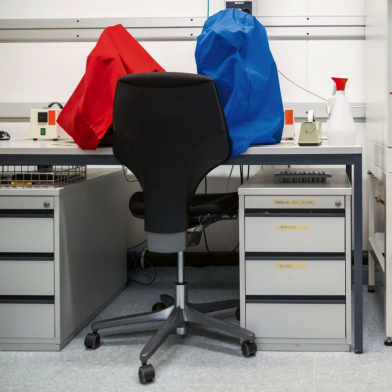
ETH researchers are normally found in the lab. "ETH Globe" asked researchers from the Department of Physics what it’s like working from home.
X-ray vision through the water window
Institute for Quantum Electronics (IQE)
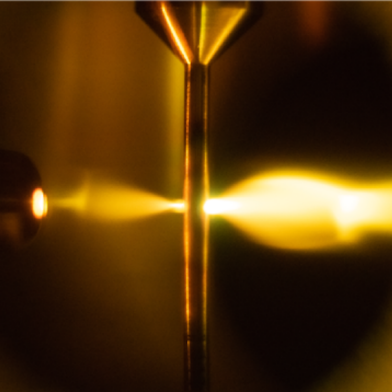
ETH physicists have developed the first high-repetition-rate laser source that produces coherent soft x-rays spanning the entire ‘water window’. That technological breakthrough should enable a broad range of studies in the biological, chemical and material sciences as well as in physics.
Photons and electrons one on one
Institute for Quantum Electronics (IQE)
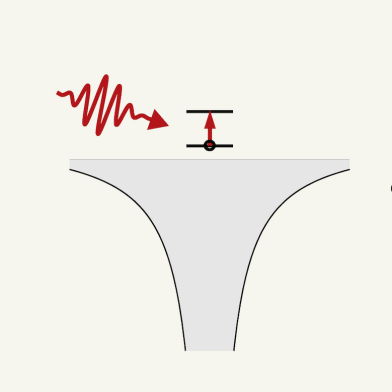
The dynamics of electrons changes ever so slightly on each interaction with a photon. The group of Prof. Ursula Keller has now measured such interplay in its arguably purest form — by recording the attosecond-scale changes associated with one-photon transitions of an unbound electron.
Five new appointments
- Laboratory for Solid State Physics (LFKP)
- Particle Physics (IPA)
- Institute for Quantum Electronics (IQE)
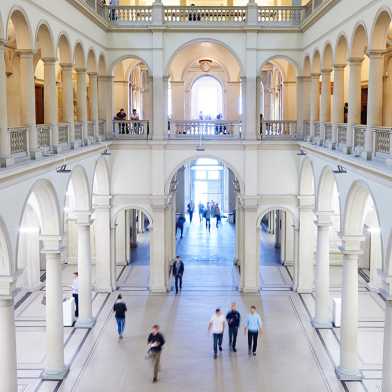
At its last meeting, the ETH Board appointed a total of 19 new professors at the request of the President of ETH Zurich, Joël Mesot. Among them are five appointments at the Department of Physics.
An international conference – online
- International
- Sustainability
- Institute for Quantum Electronics (IQE)
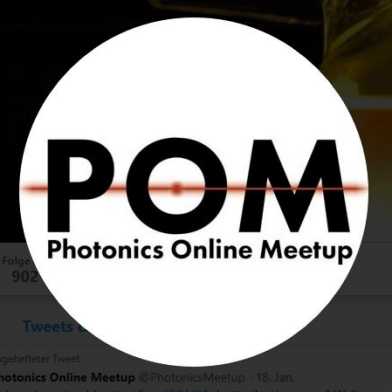
About a thousand researchers worldwide participated in the Photonics Online Meetup POM20. A conference of this size usually involves a huge effort on the part of the organising team to arrange accommodation, transfers and meals and prepare the conference venue for the participants. The time commitment and the cost of travel to the conference are also considerable for most participants. Does an online conference bring advantages?
Jonathan Home appointed Full Professor
Institute for Quantum Electronics (IQE)
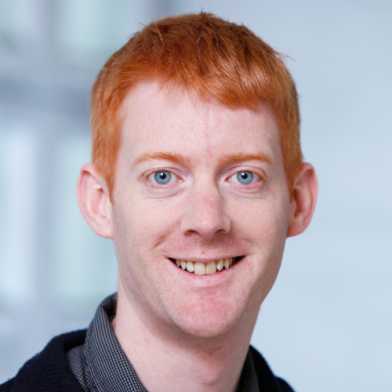
At its meeting of 11/12 December 2019 and upon application of the President of ETH Zurich, Professor Joël Mesot, the ETH Board appointed a total of 19 professors, among them physics professor Jonathan Home.
A momentous view on the birth of photoelectrons
Institute for Quantum Electronics (IQE)
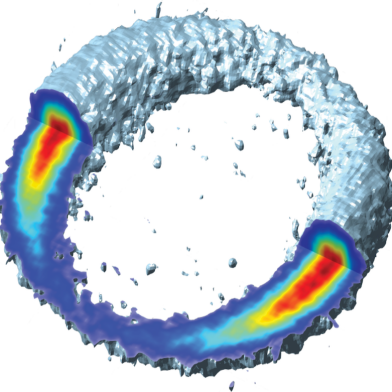
The creation of photoelectrons through ionisation is one of the most fundamental processes in the interaction between light and matter. Yet, deep questions remain about just how photons transfer their linear momentum to electrons. With the first sub-femtosecond study of the linear photon momentum transfer during an ionisation process, ETH physicists provide now unprecedented insight into the birth of photoelectrons.
A milestone in ultrashort-pulse laser oscillators
Institute for Quantum Electronics (IQE)
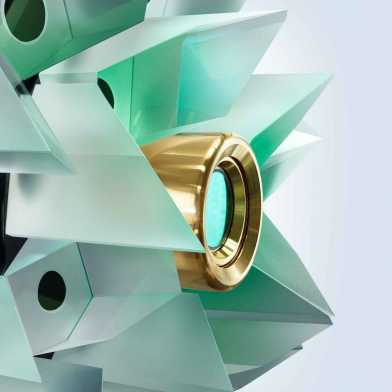
With the demonstration of a sub-picosecond thin-disk laser oscillator delivering a record-high 350-W average output power, the group of Ursula Keller sets a new benchmark and paves the path towards even more powerful lasers.
A distinct spin on atomic transport
Institute for Quantum Electronics (IQE)
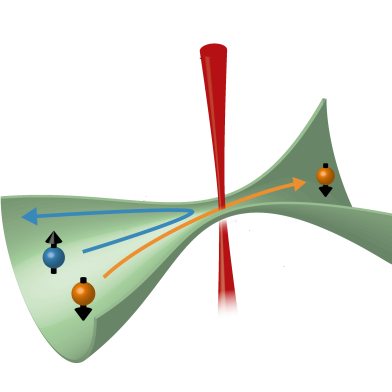
The group of Tilman Esslinger demonstrates simultaneous control over transport and spin properties of cold atoms, and thus establishes a framework for exploring concepts in spintronics and solid-state physics.
Towards an ‘orrery’ for quantum gauge theory
Institute for Quantum Electronics (IQE)
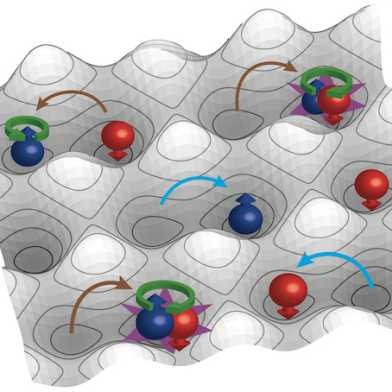
The group of Tilman Esslinger has developed a new approach to engineer quantized gauge fields coupled to ultracold matter. The method might be the basis for a versatile platform to tackle problems ranging from condensed-matter to high-energy physics.
How light steers electrons in metals
Institute for Quantum Electronics (IQE)
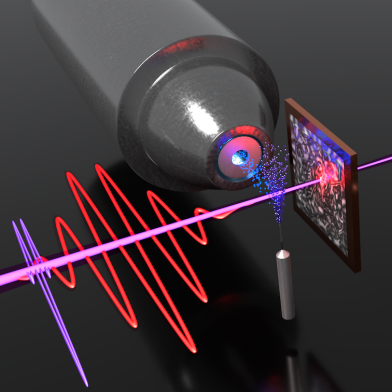
ETH physicists have measured how electrons in so-called transition metals get redistributed within a fraction of an optical oscillation cycle. They observed the electrons getting concentrated around the metal atoms within less than a femtosecond. This regrouping might influence important macroscopic properties, such as electrical conductivity, magnetization or optical characteristics. The work therefore suggests a route to controlling these properties on extremely fast time scales.
Coupled exploration of light and matter
- Laboratory for Solid State Physics (LFKP)
- Institute for Quantum Electronics (IQE)
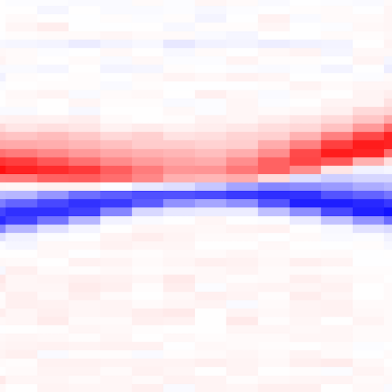
In quasiparticles known as polaritons, states of light and matter are strongly coupled. The group of Ataç İmamoğlu has now developed a new approach to study nonlinear optical properties of polaritons in strongly correlated electronic states. In doing so, they opened up fresh perspectives for exploring both ingredients of the polariton: novel functionalities for photonic devices and fundamental insight into exotic states of matter.
Terahertz technology escapes the cold
Institute for Quantum Electronics (IQE)
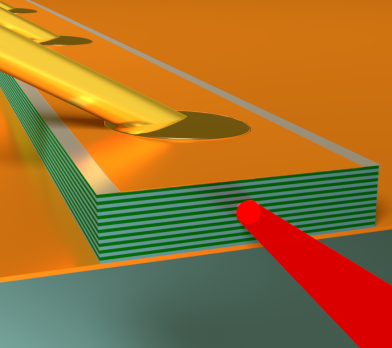
The group of Jérôme Faist in the Institute for Quantum Electronics achieved the first realization of a terahertz quantum cascade laser operating without cryogenic cooling. This feat heralds the widespread use of these devices in practical applications.
Ursula Keller receives 2019 IEEE Edison Medal
- Research awards
- Institute for Quantum Electronics (IQE)
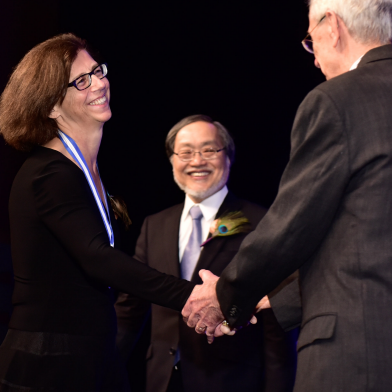
As part of last week's Honors Ceremony of the IEEE in San Diego (US), ETH physics professor Ursula Keller received the Edison Medal, in recognition of her innovations that have pushed the frontiers in ultrafast science and technology.
Rachel Grange awarded ERC Proof of Concept Grant
- Research awards
- Institute for Quantum Electronics (IQE)
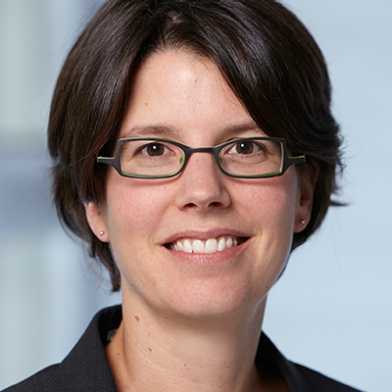
Rachel Grange, professor at the Institute for Quantum Electronics, receives one of 54 Proof of Concept Grants that the European Research Council (ERC) has awarded in the latest funding round. The grant enables her and her group to further explore the commercial potential of a new approach to the characterization of materials.
A new twist on a mesmerising story
Institute for Quantum Electronics (IQE)
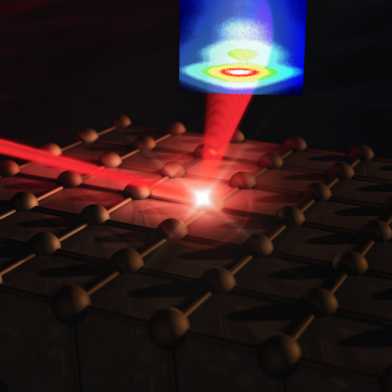
The Einstein–de Haas effect, first demonstrated more than a century ago, provides an intriguing link between magnetism and rotation in ferromagnetic materials. An international team led by ETH physicist Steven Johnson now established that the effect has also a central role in ultrafast processes that happen at the sub-picosecond timescale — and thus deliver fresh insight into materials that might form the basis for novel devices.
Three ERC Consolidator Grants for ETH physicists
- Laboratory for Solid State Physics (LFKP)
- Research awards
- Institute for Quantum Electronics (IQE)
- Particle Physics (IPA)
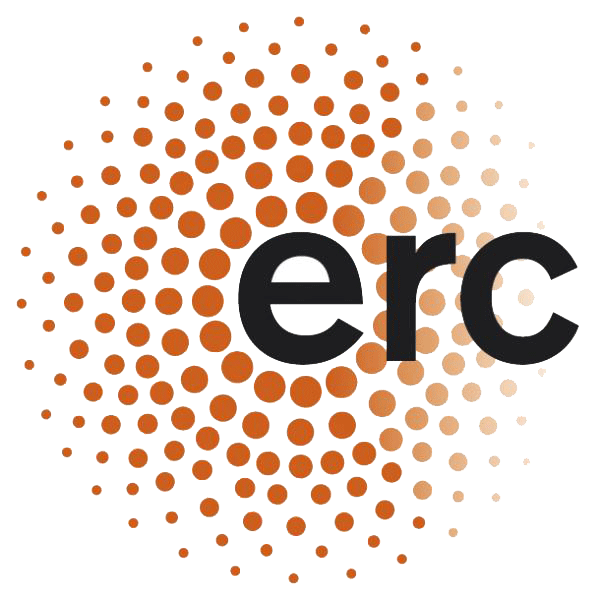
ETH researchers had excellent results in the issuing of ERC grants: they were awarded 10 Consolidator Grants in the amount of 24 million Swiss francs for their research. Among the grantees are the three physicists Paolo Crivelli, Christian Degen and Jonathan Home.
ETH launches new study programme “Master of Science in Quantum Engineering”
Institute for Quantum Electronics (IQE)

The Departments of Physics and of Electrical Engineering and Information Technology at ETH Zurich launch their new study programme “Master of Science in Quantum Engineering” in Autumn 2019. With this programme, the departments respond to the growing demand of quantum engineers with both a solid training in electrical engineering and quantum science.
Coping with errors in the quantum age
Institute for Quantum Electronics (IQE)
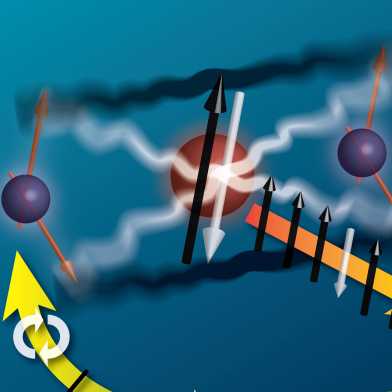
Nowadays, quantum systems can be manipulated with extremely high, but not perfect precision. ETH physicists have now demonstrated how errors that occur during such operations can be monitored and corrected on the fly.
IRsweep again among "Top 100 Swiss Startups"
Institute for Quantum Electronics (IQE)
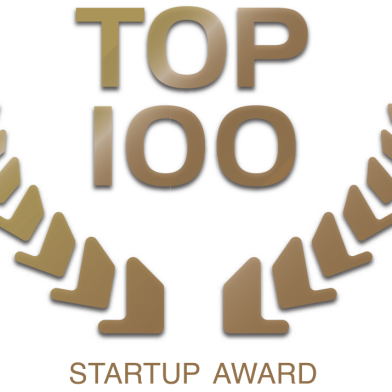
As in 2017, the ETH spin-off IRsweep, which offers cutting-edge optical spectrometers in the mid-infrared, has been named one of the 100 most innovative and promising Swiss startups, as picked by a panel of 100 investors and startup experts.
“Research is never a straightforward process”
Institute for Quantum Electronics (IQE)
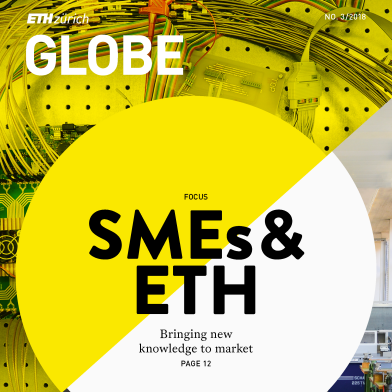
ETH physics professor Ursula Keller believes that a passion for the unknown and the ability to tolerate frustration are essential. ETH Globe posed five questions to her.
Breaking down the Wiedemann–Franz law
Institute for Quantum Electronics (IQE)
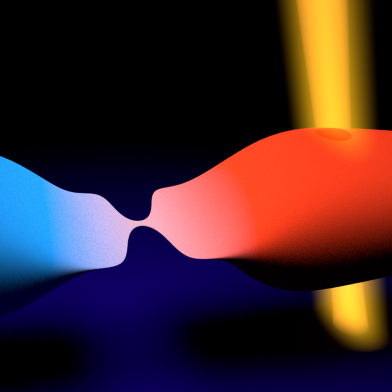
A study exploring the coupling between heat and particle currents in a gas of strongly interacting atoms highlights the fundamental role of quantum correlations in transport phenomena, breaks the revered Wiedemann–Franz law, and should open up an experimental route to testing novel ideas for thermoelectric devices.
Putting a quantum gas through its phases
Institute for Quantum Electronics (IQE)

ETH physicists have developed an experimental platform for studying the complex phases of a quantum gas characterized by two order parameters. With unprecedented control over the underlying microscopic interactions, the approach should lead to novel insight into the properties of a broad range of fundamentally and technologically important materials.
Quantum revolutions on Department Day
- Institute for Theoretical Physics (ITP)
- Institute for Quantum Electronics (IQE)
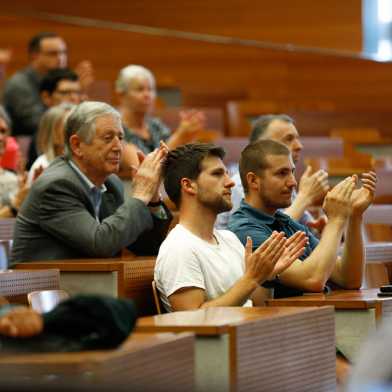
Twice a year, the management of the Department of Physics at ETH Zurich organizes events for all members of the department: the Department Day in June and the New Year's aperitif in January. These are great opportunities for the approximately 500 members of the department to come together and hear the latest news from the department management and from the research groups.
Pulsed laser — revolutionary laser technology
Institute for Quantum Electronics (IQE)
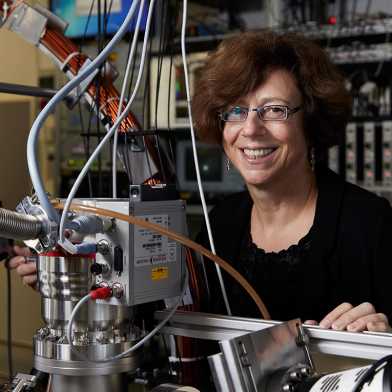
ETH physics professor Ursula Keller has been nominated by the European Patent Office, together with the French physicist Jacques Lewiner and the Danish engineer Hendrik Stiesdal, for the European Inventor Award 2018 in the category "Lifetime Achievement". Votes for the Audience Award can be cast until 3 June 2018.
Visit from Greece on the Hönggerberg
- Institute for Theoretical Physics (ITP)
- Institute for Quantum Electronics (IQE)
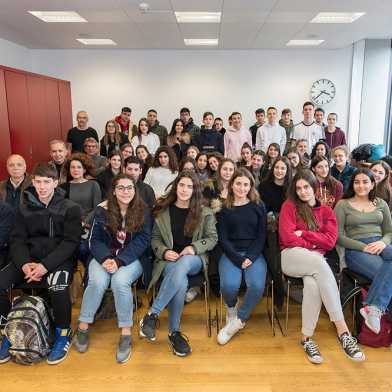
Not only Swiss Cantonal Schools, but also the 14th General Lyceum of Thessaloniki and the Psychiko College High School visited the Department of Physics in recent weeks. 77 high school students were guided by students across the Hönggerberg campus and took part in various, tailored programmes. Or they explored the campus by themselves using maps.
When nuclei catch up with electrons
Institute for Quantum Electronics (IQE)
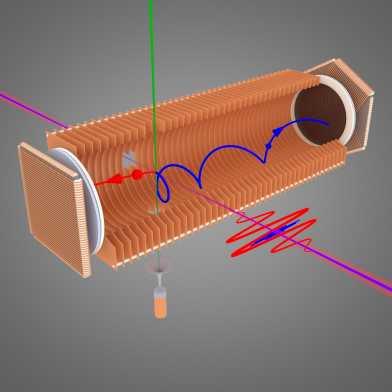
In an attosecond study of the H2 molecule ETH physicists found that for light atomic nuclei — as contained in most organic and biological molecules — the correlation between electronic and nuclear motions cannot be ignored.
ERC Advanced grant for Ursula Keller
Institute for Quantum Electronics (IQE)
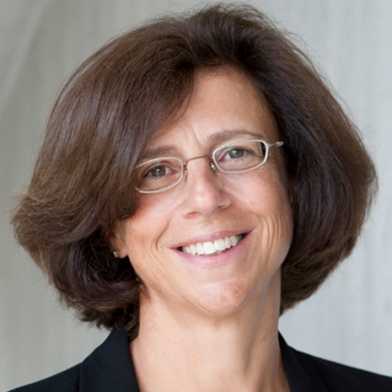
Ten professors from ETH Zurich have secured prestigious ERC Advanced Grants. Among them is physicist Ursula Keller, who is receiving the coveted funding for the second time.
Easing uncertainty
Institute for Quantum Electronics (IQE)
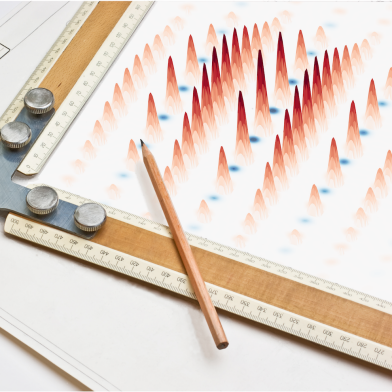
Heisenberg's uncertainty principle — the fundamental impossibility of simultaneously measuring entities such as position and momentum exactly — is at the heart of quantum theory. ETH physicists have now demonstrated an elegant way to relax this intrinsic incompatibility using a mechanical oscillator formed by a single trapped ion, opening up a route for fundamental studies and practical uses alike.
A novel test bed for non-equilibrium many-body physics
Institute for Quantum Electronics (IQE)
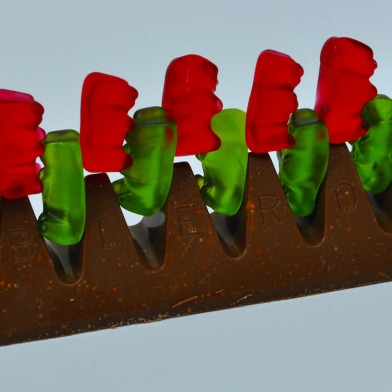
The behaviour of electrons in a material is typically difficult to predict. Novel insight comes now from experiments and simulations performed by a team led by ETH physicists who have studied electronic transport properties in a one-dimensional quantum wire containing a mesoscopic lattice.
A milestone in petahertz electronics
Institute for Quantum Electronics (IQE)
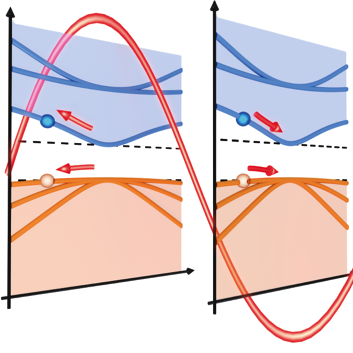
In a semiconductor, electrons can be excited by absorbing laser light. Advances during the past decade enabled measuring this fundamental physical mechanism on timescales below a femtosecond (10-15 s). ETH physicists now for the first time resolved the response of electrons in gallium arsenide at the attosecond (10-18 s) timescale, and gained unexpected insights for future ultrafast opto-electronic devices with operation frequencies in the petahertz regime.
Mastering metastable matter
Institute for Quantum Electronics (IQE)
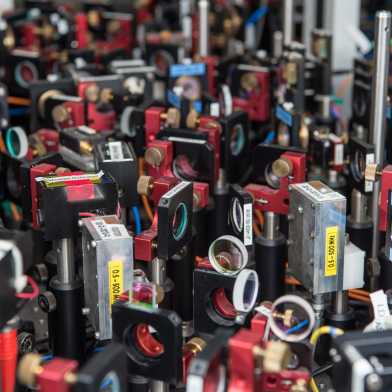
The phenomenon of metastability — when a system is in a state that is stable but not the one of least energy — is widely observed in nature and technology. Yet, many aspects underlying the mechanisms governing the behaviour and dynamics of such systems remain unexplored. ETH physicists have now demonstrated a promising platform for studying metastability on a fundamental level, using an exquisitely well controlled gas consisting of a few ten thousands of atoms.
Long-standing problem for ultrafast solid-state lasers solved
Institute for Quantum Electronics (IQE)
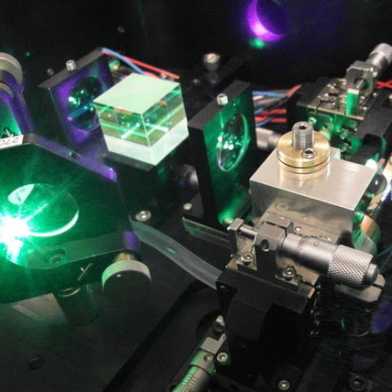
Ultrafast lasers with multi-gigahertz pulse-repetition rates are desirable for applications requiring high sampling rates or resolvable frequency-comb lines. ETH researchers have now solved one of the long-standing problems that has hindered progress towards gigahertz diode-pumped ultrafast solid-state lasers.
Quantum cocktail provides insights on memory control
Institute for Quantum Electronics (IQE)
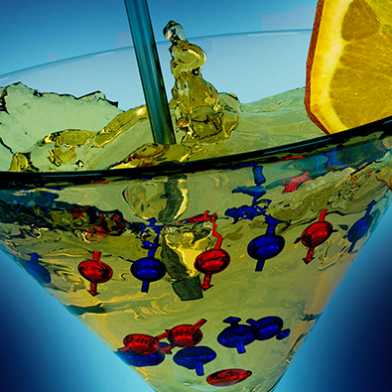
Experiments based on atoms in a shaken artificial crystal made of light offer novel insight into the physics of quantum many-body systems — which might help in the development of future data-storage technologies.
IEEE Medal for Environmental and Safety Technologies for Jérôme Faist
Institute for Quantum Electronics (IQE)
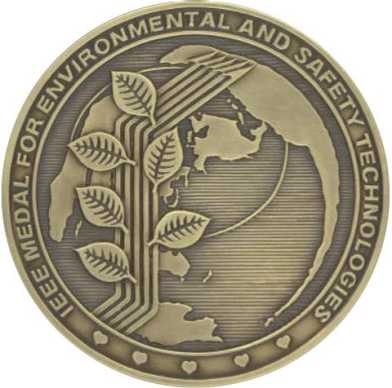
The 2018 IEEE Medal for Environmental and Safety Technologies will be awarded to Prof. Jérôme Faist (ETH Zurich) and Frank Tittel (Rice University, US), "for pioneering contributions to the quantum cascade laser and optical chemical sensors for environmental sensing".
A look into the future
Institute for Quantum Electronics (IQE)
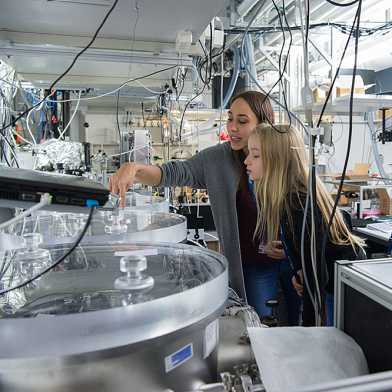
For the Swiss national 'Future Day', the Department of Physics had this year two programmes on offer, to grant children a glance into their possible professional futures — be it in science or in a technical profession.
Biomedical optical imaging made simpler
Institute for Quantum Electronics (IQE)
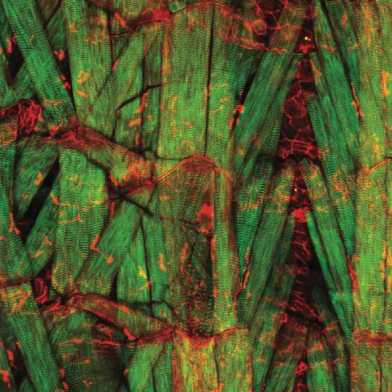
The groups of Ursula Keller (ETH) and Fritjof Helmchen (University of Zurich & ETH) have demonstrated that small, reliable and cost-effective femtosecond semiconductor disk lasers can compete with more complex Ti:Sapphire lasers in in vivo multiphoton imaging experiments.
"He explores the computer of tomorrow"
Institute for Quantum Electronics (IQE)
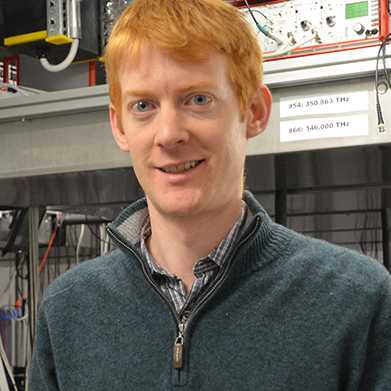
As part of its "Quantum Revolution" series, the Swiss daily Tages-Anzeiger portrays ETH physicist Jonathan Home, who works on quantum computers based on trapped ions.
As the atoms flow
- Research
- Institute for Quantum Electronics (IQE)
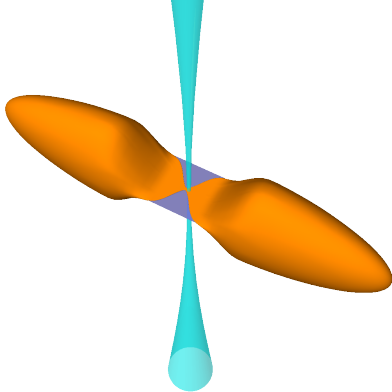
Borrowing a technique developed for mapping electrical conductance in semiconductor devices, physicists at ETH imaged cold neutral atoms as they are transported through constrictions narrow enough for quantum effects to come into play. These results highlight the potential of using neutral atoms to simulate electronic transport in nanoscale devices.
Steven Johnson appointed Associate Professor
Institute for Quantum Electronics (IQE)
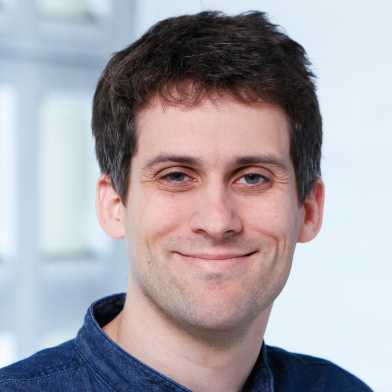
The ETH Board just appointed eight new professors at ETH Zurich, among them physicist Steven Johnson of the Institute for Quantum Electronics.
Ursula Keller receives Weizmann Women & Science Award
Institute for Quantum Electronics (IQE)
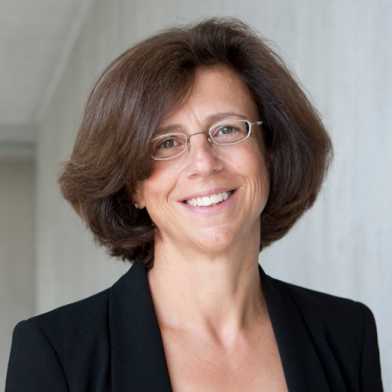
Ursula Keller, Professor at the Institute for Quantum Electronics, received today one of the two 2017 Weizmann Women & Science Awards "for pioneering and seminal contributions to ultrafast lasers technology and important breakthroughs in attosecond science".
Two BRIDGE grants for young ETH physicists
- Physics
- Institute for Quantum Electronics (IQE)
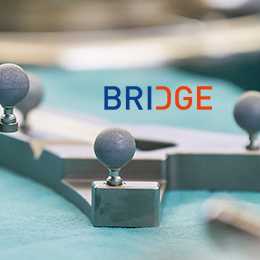
The first BRIDGE Proof of Concept call of the Swiss National Science Foundation (SNSF) and the Commission for Technology and Innovation (CTI) attracted 101 proposals, submitted by young researchers from across Switzerland. Eleven ideas have now been funded, including the two projects of ETH physicists Mariia Timofeeva and Florian Emaury.
ERC Advanced Grant to Tilman Esslinger
Institute for Quantum Electronics (IQE)
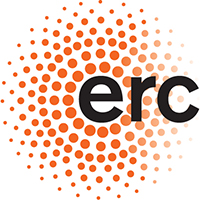
ETH researchers have received eight of the coveted Advanced Grants in the European Research Council's (ERC) latest call for proposals, among them physicist Tilman Esslinger, who has been awarded such a grant already for the second time.
Facilitating innovation in space
Institute for Quantum Electronics (IQE)
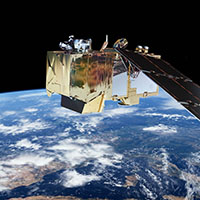
The ESA BIC Switzerland programme is starting its second round with seven additional start-ups. Amongst others, the jury was won over by the ETH spin-off "IRsweep". Using a spectrometer that utilises infra-red laser radiation, the startup wants to make environmental analysis from space more precise.
ERC Consolidator Grant to Giacomo Scalari
Institute for Quantum Electronics (IQE)
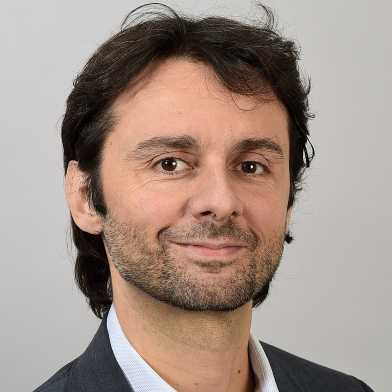
Three ETH Zurich researchers have received ERC Consolidator Grants from the European Research Council (ERC), among them physicist Giacomo Scalari. Their projects will each receive approximately 2 million Swiss francs in funding.
A visit to the Quantum Device Lab
Institute for Quantum Electronics (IQE)
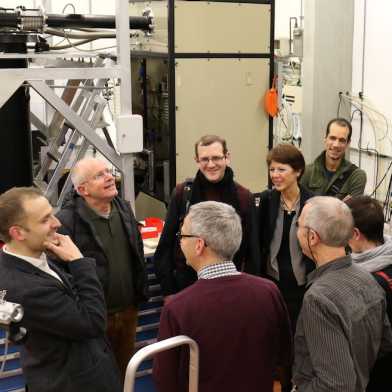
What sort of options do high-school students have for their future? How does work in basic research look like? What do scientists explore in the Quantum Device Lab at ETH Zurich? Teachers of the canton school Zurich Oberland (KZO) wanted to know.
Jonathan Home appointed Associate Professor
Institute for Quantum Electronics (IQE)
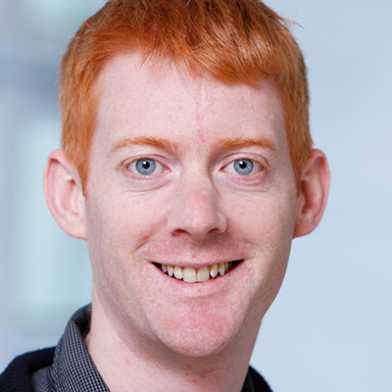
Upon application of ETH President Lino Guzzella the ETH Board appointed a total of eight professors — including physics professor Jonathan Home — and awarded the title of professor to one individual.
ERC Starting Grant for Rachel Grange
Institute for Quantum Electronics (IQE)

Rachel Grange, Assistant Professor in Photonics at the Institute for Quantum Electronics, has been awarded one of the prestigious ERC Starting Grants.
Sphere of Thinking – Exchange across disciplines
- Institute for Theoretical Physics (ITP)
- Institute for Quantum Electronics (IQE)
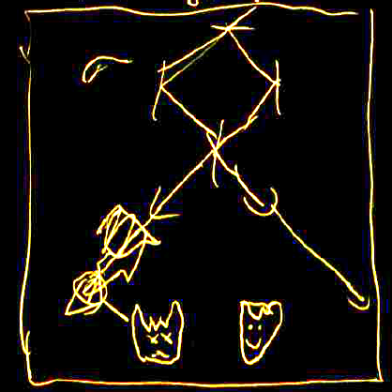
Are there common areas of interest between physics and theater? As part of the lecture series "Getting Real" at the Zurich University of the Arts, ZHdK, the two ETH physicist Gregor Jotzu and Philipp Kammerlander have been invited as guest speakers.
A guide for time travellers
Institute for Quantum Electronics (IQE)
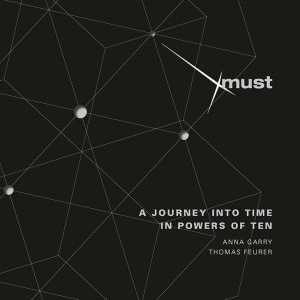
A new book illustrates time scales from 10–16 to 1018 seconds. A Journey into Time in Powers of Ten, produced by the NCCR MUST, provides context and food for many 'second thoughts'.
A shuttle to quantum computers
- Research
- Institute for Quantum Electronics (IQE)
- D-PHYS
- Quantum sciences
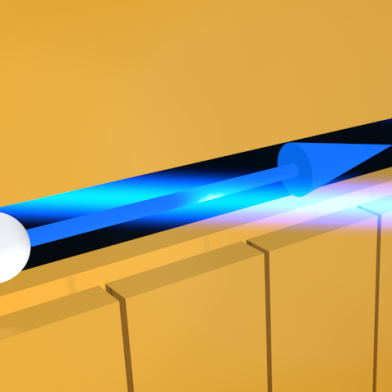
Well-controlled shuttling of ions through laser beams should enable scalable quantum computing.
A step towards quantum engineering
- Research
- Institute for Quantum Electronics (IQE)
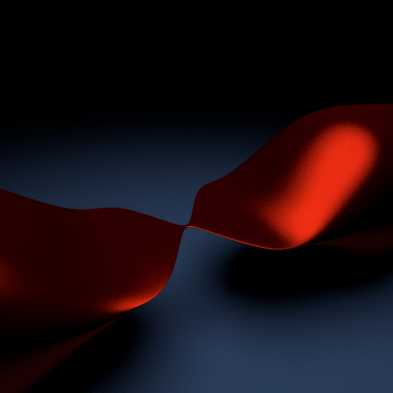
Physicists connected two materials with unusual quantum-mechanical properties through a quantum constriction, could open up a novel path towards both a deeper understanding of physics and future electronic devices.